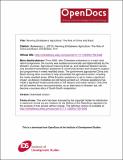| dc.contributor.author | Mukwereza, L | |
| dc.coverage.spatial | Zimbabwe | en_GB |
| dc.coverage.spatial | China | en_GB |
| dc.coverage.spatial | Brazil | en_GB |
| dc.date.accessioned | 2013-05-15T12:28:44Z | |
| dc.date.available | 2013-05-15T12:28:44Z | |
| dc.date.issued | 2013 | |
| dc.identifier.citation | Mukwereza, L. (2013). Reviving Zimbabwe’s Agriculture: The Role of China and Brazil. IDS Bulletin, 44.4 | en_GB |
| dc.identifier.uri | https://opendocs.ids.ac.uk/opendocs/handle/20.500.12413/2611 | |
| dc.description | Submitted version of Bulletin article | en_GB |
| dc.description.abstract | From 2000, after Zimbabwe embarked on a major land reform programme, the country was isolated economically and diplomatically by the Western countries. Agricultural financing dried up, and traditional Western donors only provided humanitarian assistance to communal farmers and refused to support any programmes in newly resettled areas. The government approached China and Brazil among other countries to help resuscitate the agricultural sector; including the newly resettled areas. While Brazilian assistance is yet to make a significant impact, as delivery modalities are still being worked out, Chinese assistance has made a significant impact particularly in the tobacco and cotton sectors. Only time will tell whether these new partnerships, as an alternative to Western aid, will become a success story of South-South cooperation. | en_GB |
| dc.description.sponsorship | DFID, ESRC | en_GB |
| dc.language.iso | en | en_GB |
| dc.publisher | Wiley | en_GB |
| dc.relation.ispartofseries | China and Brazil in African Agriculture; | |
| dc.rights.uri | http://www.ids.ac.uk/files/dmfile/IDSOpenDocsStandardTermsOfUse.pdf | en_GB |
| dc.subject | Agriculture | en_GB |
| dc.subject | Aid | en_GB |
| dc.subject | Development Policy | en_GB |
| dc.title | Reviving Zimbabwe’s Agriculture: The Role of China and Brazil | en_GB |
| dc.type | Article | en_GB |
| dc.identifier.koha | 228746 | |

